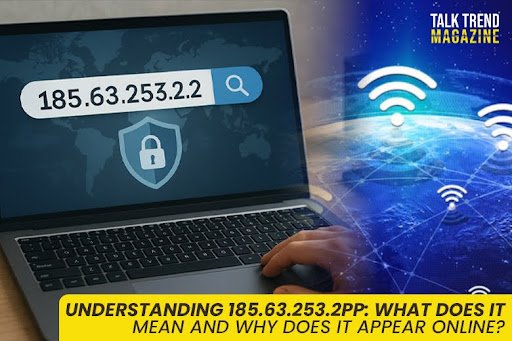If you have ever seen 185.63.253.2pp in your website log, analytics, or online discoveries, you might be surprised what it really represents. At first glance, it looks like an IP address, but it feels something about it. This is because in the end “PP” makes it invalid as a real IP address.
Nevertheless, this strange-looking word often appears online, which makes people curious. Let us know what it is, where it comes from, and it is something that you should worry about.
185.63.253.2 PP a real IP address?
There is no brief answer – not in that accurate form.
A proper IPV4 address always follows such a format: 185.63.253.2 (four sets of numbers separated by dots). Once letters or additional characters such as “PP” are added, it stops becoming valid. However, the numerical part – 185.63.253.2 – is actually the real address of a hosting provider located in the Netherlands.
Public data suggests that this IP range (185.63.253.0/24) is associated with a company called Hostplace Datasitter Limited, which provides hosting and server infrastructure. This means that it is used by websites or applications running on their network rather than by individual users.
The suffix “PP” is one that causes confusion. Since it is not part of the IP format, the browser may not connect to it, and most lookup tools will either reject or modify it automatically.
Why does 185.63.253.2pp appear on the Internet?
There are some general explanations for why you can cross 185.63.253.2pp:
1. A Typing Error or Formatting Mistake
Many times, people simply mistype or copy an IP address incorrectly. The “pp” could have been added accidentally when pasting or editing text.
2. Obfuscation or Tracking Purposes
Some websites deliberately add extra letters to prevent automatic linking or web crawlers from following the IP address. In this case, “pp” may have been added as a small marker or tag for internal tracking.
3. SEO or Educational Content
Over time, several blogs and tech explainers have used “185.63.253.2pp” in their examples when discussing network safety, online tracking, or IP-related searches. Because of this repetition, the phrase now appears across multiple online sources — even though it is technically incorrect.
In simple terms, “185.63.253.2pp” is not unsafe by itself. It is more of a digital typo that keeps circulating.
What to Do if You See 185.63.253.2pp in Logs or Analytics?
If this term shows up in your website’s backend data, do not panic. It is often harmless. Still, here is how you can handle it smartly:
Check Your Raw Logs Carefully
Confirm whether the entry shows “185.63.253.2pp” or just “185.63.253.2.” If it includes the letters, it is likely an invalid string and not a real network connection.
Look For Activity Patterns
If you notice multiple hits or repeated attempts to access certain files, check the source behavior. A few visits could be automated bots, while persistent access might need a closer look.
Run a Proper IP Lookup
Remove the “pp” and look up “185.63.253.2” using a trusted IP checking tool. You will find that it belongs to a hosting company’s network — a common source of both legitimate and automated traffic.
Avoid Clicking Strange Links
If you ever find “185.63.253.2pp” as a hyperlink, do not open it. Since it is not a valid destination, clicking could redirect you to an unknown or unsafe page.
In most situations, the presence of this string does not mean a security breach. It is just a signal to double-check your data formatting and keep an eye on traffic sources.
The Real IP Behind the Confusion
When you strip away the extra letters, the IP 185.63.253.2 points to a server located in the Netherlands. It falls under the management of Hostpalace Datacenters Ltd, which provides virtual hosting and cloud services.
This type of IP address usually belongs to web servers or automated systems that connect with many websites daily. It is not uncommon to see it in your log; This simply means that your website received a request from a hosted machine instead of a home network.
However, with any unfamiliar IP, monitoring for suspicious behavior is a good practice, especially if you notice a large number of frequent trips or failed login efforts.
What Most Sources Agree On?
When reviewing other articles about 185.63.253.2pp, the general agreement is clear:
- The “pp” makes the string invalid.
- The numeric IP is linked to a legitimate hosting provider.
- If you withstand the word online, you should be considered either an error or a non-functional example.
Cybersecurity newsletters often use this example to remind readers about verifying IP formats and being vigilant with random links that do not look right.
Key Takeaways
- 185.63.253.2pp is not a real IP address. It is likely a typo or modified label.
- The valid part, 185.63.253.2, belongs to a hosting provider in the Netherlands.
- If you see this term in logs, check context and patterns, but do not assume it is a threat.
- Avoid interacting with links or content that use this invalid form.
Final Thoughts
In today’s digital world, odd wires such as 185.63.253.2pp can easily cause confusion. But once you understand what they mean, nothing about them is mysterious. It is essentially an incorrect or edited IP address that keeps on online revival through copied materials.
When you notice it, treat it as a reminder: always verify technical details before reacting. Keep your security tools updated, monitor traffic wisely, and rely on trusted lookup sources. That way, you will stay informed and protected, no matter what strange-looking strings pop up in your data next.

